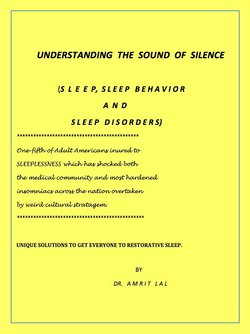Читать книгу Understanding the Language of Silence - Sleep, Sleep Behavior and Sleep Disorders - Dr. Amrit Lal - Страница 12
На сайте Литреса книга снята с продажи.
GENDER ISSUE
ОглавлениеSleep problems among adult women are connected with causes peculiar to their gender – half of them during their menstrual period, three-quarters during pregnancy and child-birth and many attributed to menopause later in life with hot flushes, night sweating and insomnia. Women undergo more sleep changes and more challenges than men because of their hormone issues – for example, during the first trimester of pregnancy the sleep need rises.
A National Sleep Foundation poll (1988) Women and Sleep of all adults revealed that the average woman aged 30 – 60 sleeps only six hours and forty minutes during the weekday, but sleep problems affect them more than men. They report depression twice as much more than men apart from a higher incidence of anxiety, stress, reflux, bladder problem or pain. More women (58%) suffer from nighttime pain than men (48%) according to a 1996 National Sleep Foundation Gallup Poll.
When it comes to older women - because of the onset of menopause, they are at a particular risk of sleep disorders. In fact, “sleep disorders are one of the hallmark symptoms of menopause from one-quarter to one-half of women.” It has also been suggested that estrogen (whose level goes down after menopause) is associated with increased sleep time and decreased number of nighttime arousals.
An interesting question has sometime been raised as to who sleeps better at night – men versus women, and singles versus couples. As reported in Wall Street Journal of June 5, 2012, correspondent Andrea Peterson has this to say,” Couples may get health benefits simply by sleeping in the same bed… In fact, some scientists believe that sleeping with a partner may be a reason why people with close relationships tend to be in better health and live longer.” Women in long term stable relationships fall sleep more quickly and have less number of arousals during the night than single women. The underlying hypothesis suggests that by promoting feeling of security and safety, shared sleep lowers stress hormone (cortisone) and raises love hormones (endorphins) known to ease anxiety.
